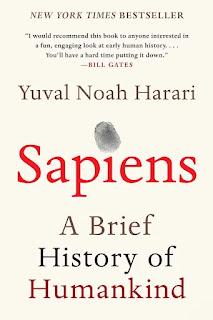Sapiens: A Journey Through Human History
In his seminal work, "Sapiens: A Brief History of Humankind," Yuval Noah Harari takes readers on an illuminating expedition through the annals of human history. Published in 2011, this thought-provoking book has garnered international acclaim for its captivating narrative, deep insights, and challenging perspectives on the origins and development of our species. Harari seamlessly weaves together disciplines such as anthropology, biology, and history to unravel the mysteries of our shared past. In this article, we will delve into the key themes and ideas presented in "Sapiens" that have sparked intense intellectual debates, reshaping our understanding of humanity and prompting us to reflect on our present and future.
The Cognitive Revolution And The Emergence Of Homo Sapiens:
Harari begins his exploration by plunging us into the Cognitive Revolution, a pivotal moment that distinguished Homo sapiens from other species. He argues that the key to our species' success lies in our unique ability to create and believe in shared myths. These myths, encompassing concepts such as religion, money, and nations, enabled Homo sapiens to collaborate effectively in large groups, leading to the establishment of complex societies. Harari emphasizes the importance of language, which allowed humans to communicate and coordinate, thereby propelling the growth of agriculture, cities, and civilizations. This cognitive leap set in motion a series of transformations that forever altered the course of human history.
The Agricultural Revolution And Its Consequences :
Another critical turning point discussed in "Sapiens" is the Agricultural Revolution, marking the transition from nomadic hunter-gatherer societies to settled agricultural communities. Harari highlights the profound impact this shift had on human existence, presenting both its benefits and drawbacks. While agriculture provided a stable food supply, facilitating population growth and the development of complex civilizations, it also introduced significant challenges. The advent of agriculture led to social hierarchies, economic inequality, and the rise of infectious diseases. Harari's thought-provoking analysis compels us to reevaluate the conventional belief that the Agricultural Revolution was an unambiguous progress, urging us to critically examine the consequences of this pivotal moment in human history.
The Unification Of Humankind And The Rise Of Empires :
Harari delves into the rise of empires, a phenomenon that facilitated the unification of vast territories under a single political order. He illuminates how empires played a crucial role in shaping human history by enabling the spread of ideas, cultures, and technology across different regions. Through their conquests, empires fostered interconnectedness and created a shared global history. However, Harari also explores the delicate balance between cooperation and exploitation that characterized these empires. He examines the reasons behind their successes, as well as the factors contributing to their eventual collapses. Harari's nuanced analysis encourages us to acknowledge the lasting legacy of empires and their continued influence on the modern world.




Comments
Post a Comment